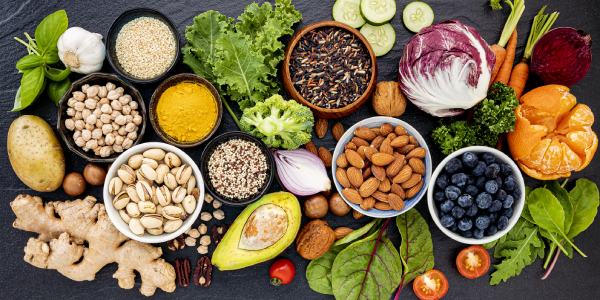Plant-Based Diets: Benefits and Challenges
Curious about plant-based diets? Learn the health benefits, environmental impact, and common challenges of switching to a plant-based lifestyle.
DIETSNUTRITION AND MENTAL HEALTHNUTRITION ADVICE
9/4/20252 min read


Introduction
Plant-based diets are becoming increasingly popular worldwide. Some people choose them for health reasons, others for environmental concerns, and many for ethical beliefs. But what exactly is a plant-based diet? Is it just about eating vegetables, or is there more to it? In this article, we’ll explore the benefits and challenges of plant-based diets, and provide practical tips for anyone considering this lifestyle.
1. What Is a Plant-Based Diet?
A plant-based diet focuses on foods primarily from plants—fruits, vegetables, whole grains, nuts, seeds, and legumes. Unlike strict vegan diets, some plant-based eaters may still include small amounts of animal products such as dairy, eggs, or fish, but the majority of their meals come from plant sources.
2. Health Benefits of a Plant-Based Diet
Better Heart Health
Studies show that people who eat more plant-based foods have a lower risk of heart disease. This is because plant foods are naturally low in saturated fat and high in fiber.
Weight Management
Plant-based diets tend to be lower in calories, which can help with weight control. Fiber-rich foods also make you feel full longer.
Reduced Risk of Chronic Diseases
Eating mostly plants is linked to a lower risk of type 2 diabetes, high blood pressure, and some cancers.
Improved Digestion
Whole grains, beans, and vegetables are packed with fiber, which supports gut health and regular digestion.
💡 Related: Read our guide on 10 Golden Rules for a Balanced Diet.
3. Environmental Benefits
A plant-based diet doesn’t just help your body—it helps the planet.
Lower carbon footprint: Growing plants requires fewer resources than raising livestock.
Reduced water use: Producing meat requires far more water than growing crops.
Less deforestation: Plant-based eating reduces demand for land used in animal farming.
4. Common Challenges of Plant-Based Diets
Getting Enough Protein
One of the biggest concerns is protein intake. While meat is a rich source, plants like lentils, chickpeas, tofu, and quinoa also provide high-quality protein.
Vitamin and Mineral Deficiencies
Some nutrients are harder to get from plants, such as Vitamin B12, iron, and omega-3 fatty acids. Supplementation or fortified foods may be needed.
Social and Cultural Barriers
Eating out, family gatherings, or traditional diets can make sticking to plant-based eating difficult.
5. Tips for Transitioning to a Plant-Based Diet
Start slow: Replace one or two meals per week with plant-based options.
Focus on variety: Mix vegetables, legumes, nuts, and whole grains for balanced nutrition.
Plan ahead: Meal prepping ensures you always have healthy options available.
Learn new recipes: Experiment with global cuisines like Mediterranean, Indian, or Middle Eastern dishes.
💡 Related: See our article on Healthy Eating on a Budget: Tips and Tricks.
6. A Sample Plant-Based Meal Plan
Breakfast: Overnight oats with almond milk, chia seeds, and berries
Lunch: Quinoa salad with chickpeas, cucumbers, and tahini dressing
Snack: Hummus with carrot sticks and whole-grain crackers
Dinner: Lentil curry with brown rice and spinach
7. Is a Plant-Based Diet Right for You?
A plant-based diet can work for most people, but it’s important to listen to your body. Some may thrive completely vegan, while others may need small amounts of animal products to meet their nutritional needs.
Conclusion
Plant-based diets offer numerous health and environmental benefits, from lowering disease risk to protecting the planet. However, they also come with challenges, including nutrient deficiencies and social barriers. The key is balance, preparation, and flexibility. Whether you go fully vegan or simply increase your intake of plant foods, every step toward a plant-based lifestyle can make a positive difference—for your health and for the world.
